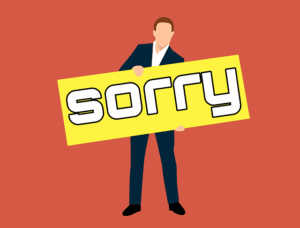[While there’s absolutely a need to take care when dealing with issues involving major risk of litigation, sometimes the situation demands a clear, “We’re sorry”. In this guest post, reputation and crisis expert Mark Story asks why it was those words Boeing battled to avoid saying in the face of crashing 737 Max aircraft.]
Boeing: “sorry” doesn’t have to be the hardest word
Peruse any newspaper, news aggregator or social media feed and you will see that outrage appears to be the default response for many, especially for those who quickly take to social media to express anger. Outrage can and does provide a spark of discontent and stokes the flames of reputational crises. Organizations whose reputations are threatened need to respond to crises quickly, but equally importantly, effectively.
Institutions or individuals can recover from crises by showing empathy, demonstrating that they have heard their publics’ concerns and have done something to address them. A crisis is not the time to prove that you are right, it’s an opportunity to show that you are listening and atone for things that you may have done wrong.
In March of 2019 after two crashes of two of Boeing’s 737 Max aircraft that appeared to be linked, international pressure mounted on the company to ground the airplanes and perform rigorous safety inspections. Government authorities around the world suspended operation of the aircraft and rather than taking the opportunity to do what many saw as the proper thing to do, Boeing resisted grounding them. Their CEO even called the U.S. President to assure/lobby him that the planes were safe even after government authorities around the world grounded the aircraft.
Boeing’s 737 Max initial crisis response was slow, clumsy and was largely a self-inflicted wound. They did not stress empathy for the families of those who died nor acknowledge the fears of passengers who fly on their aircraft. Their CEO calling the U.S. President to convince him to not ground the planes made it appear that Boeing valued profit over safety. Given the opportunity to do what many viewed as the right thing, Boeing appeared tone deaf and interested only in keeping the planes flying in the U.S.
While a quick response to an unfolding crisis is critically important, organizations still get wrong what the public expects: say that you are sorry for what happened and for what you did or did not do. Boeing should have done a much better job of acknowledging the grief and fear of people throughout the world and sincerely apologizing for the loss of life. In short, they should have beaten themselves up about it worse than the public could do.
The quote below is from a Forbes blog post by Davia Temin from April 2019, “Great Crisis Management Is Counterintuitive: That’s Why Boeing, Wells Fargo Are Getting It So Wrong.” In it, she lays out how to really apologize in today’s environment in which outrage is the norm:
What really works in a crisis situation these days is authentic and true groveling. Now I don’t mean a formulaic response on how management takes the problem “very seriously.” I mean prostration – the organization literally throwing itself on its sword in atonement. Over and over again.
In their March 11, 2019 press release, Boeing had a golden opportunity to express their true remorse over the loss of life. Instead, they offered paragraphs laced with technical jargon like this:
Boeing’s 737 MAX Flight Crew Operations Manual (FCOM) already outlines an existing procedure to safely handle the unlikely event of erroneous data coming from an angle of attack (AOA) sensor. The pilot will always be able to override the flight control law using electric trim or manual trim. In addition, it can be controlled through the use of the existing runaway stabilizer procedure as reinforced in the Operations Manual Bulletin (OMB) issued on Nov. 6, 2018.
Emotion needs to be answered with emotion, not acronyms. Instead, in the last paragraph of their release that contained 494 words, Boeing stated:
Additionally, we would like to express our deepest condolences to those who lost loved ones on Ethiopian Airlines Flight 302.
To Ms. Temin’s point, to help recover from a crisis, organizations need to apologize sincerely and acknowledge what they have done wrong and what they will do better. If, during and after a crisis, institutions punish themselves harder than their stakeholders can, forgiveness is likely to follow on the path to recovery. Boeing is in an industry in which terrible things happen all too frequently and they should know better.
For Boeing, “sorry” should not have been the hardest word.
Mark Story is a reputation management and crisis expert who helps individuals and organizations protect, preserve and defend their reputations. To learn more about Mark, please visit his web site.
